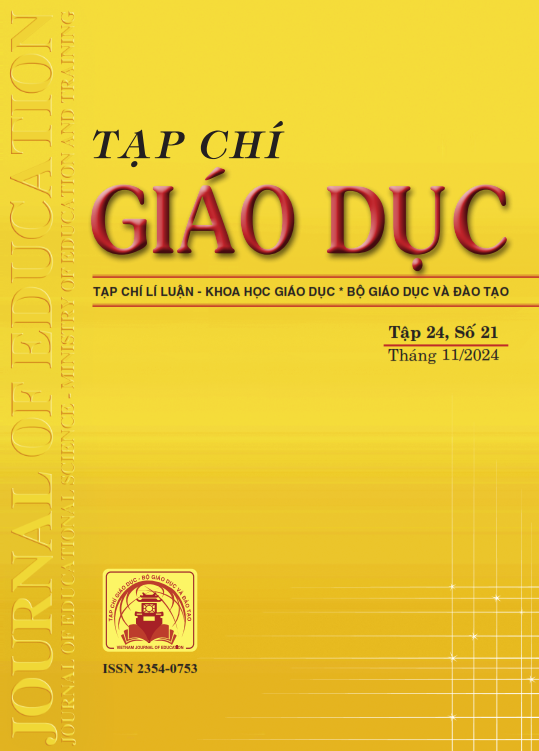Một số yếu tố ảnh hưởng đến hành vi tìm kiếm sự trợ giúp về sức khoẻ tâm thần của học sinh trung học phổ thông
Tóm tắt
After the Covid-19 pandemic, awareness of mental health has been significantly increased, especially among high school students. This paper analyzes the factors affecting professional help-seeking behavior for mental wellbeing among high school students in Vietnam. We used a mixed methods approach, combining theoretical analysis and empirical investigation through a questionnaire survey. Although students have relatively good knowledge about mental health, they tend to prioritize seeking help from family and friends rather than professional services. The main reasons are cultural stigma against mental problems and limited access to professional support services. Overall, interventions should focus on raising mental health awareness, reducing stigma, and improving access to and trust in professional support systems. The research results will serve as a basis for schools and policymakers to make recommendations for developing more effective intervention strategies and support policies in the post-pandemic context.
Tài liệu tham khảo
Bamberger, P. (2009). Employee help-seeking: Antecedents, consequences and new insights for future research. In Research in personnel and human resources management (pp. 49-98). https://doi.org/10.1108/s0742-7301(2009)0000028005
Barker, S. B., Knisely, J. S., McCain, N. L., & Best, A. M. (2005). Measuring Stress and Immune Response in Healthcare Professionals following Interaction with a Therapy Dog: A Pilot Study. Psychological Reports, 96(3), 713-729. https://doi.org/10.2466/pr0.96.3.713-729
Blaxter, M. (2010). Health (2nd ed.). Cambridge: Polity.
Bộ Y tế (2023). Đề án tăng cường hệ thống chăm sóc sức khỏe tâm thần giai đoạn 2024-2030.
Bradford, S., & Rickwood, D. (2012). Adolescent’s preferred modes of delivery for mental health services. Child and Adolescent Mental Health, 19(1), 39-45. https://doi.org/10.1111/camh.12002
Brown, B. B., & Larson, J. (2009). Peer relationships in adolescence. In R. Lerner & L. Steinberg (Eds.), Handbook of adolescent psychology (pp. 74-103). Wiley.
Burgess, C. P., Johnston, F. H., Berry, H. L., McDonnell, J., Yibarbuk, D., Gunabarra, C., Mileran, A., & Bailie, R. S. (2009). Healthy country, healthy people: the relationship between Indigenous health status and “caring for country.” The Medical Journal of Australia, 190(10), 567-572. https://doi.org/10.5694/j.1326-5377.2009.tb02566.x
Giang, T. (2024). The Influence of Confucianism on the Self-Esteem of the Adolescents with Self-Destructive Behaviour: A Vietnamese Phenomenological Study. International Journal of Positivity &Amp Well-Being, 2(2), 102-116. https://doi.org/10.61518/ijpw-50
Greenley, J. R., & Mechanic, D. (1976). Social selection in seeking help for psychological problems. Journal of Health and Social Behavior, 17(3), 249. https://doi.org/10.2307/2136546
Gulliver, A., Griffiths, K. M., & Christensen, H. (2010). Perceived barriers and facilitators to mental health help-seeking in young people: a systematic review. BMC Psychiatry, 10(1). https://doi.org/10.1186/1471-244x-10-113
Kessler, R. C., Mickelson, K. D., & Williams, D. R. (1999). The prevalence, distribution, and mental health correlates of perceived discrimination in the United States. Journal of Health and Social Behavior, 40(3), 208. https://doi.org/10.2307/2676349
Kuhl, J., Jarkon-Horlick, L., & Morrissey, R. F. (1997). Measuring Barriers to Help-Seeking Behavior in Adolescents. Journal of Youth and Adolescence, 26(6), 637-650. https://doi.org/10.1023/a:1022367807715
Lee, F. (1997). When the going gets tough, do the tough ask for help? help seeking and power motivation in organizations. Organizational Behavior and Human Decision Processes, 72(3), 336-363. https://doi.org/10.1006/obhd.1997.2746
Liu, Q., Liu, Z., Lin, S., & Zhao, P. (2022). Perceived accessibility and mental health consequences of COVID-19 containment policies. Journal of Transport & Health, 25. https://doi.org/10.1016/j.jth.2022.101354
Nadler, A. (1987). Determinants of help-seeking behavior: The effects of helper’s similarity, task centrality and recipient’s self-esteem. European Journal of Social Psychology, 17, 57-67.
O’Mahony, M., & Hegarty, J. (2009). Help Seeking for Cancer Symptoms: A review of the literature. Oncology Nursing Forum, 36(4), E178-E184. https://doi.org/10.1188/09.onf.e178-e184
Picco, L., Abdin, E., Chong, S. A., Pang, S., Shafie, S., Chua, B. Y., Vaingankar, J. A., Ong, L. P., Tay, J., & Subramaniam, M. (2016). Attitudes toward Seeking Professional Psychological help: factor structure and Socio-Demographic Predictors. Frontiers in Psychology, 7. https://doi.org/10.3389/fpsyg.2016.00547
Polit, D. F., & Beck, C. T. (2010). Essentials of nursing research: Appraising evidence for nursing practice (7th ed.). Wolters Kluwer Health/Lippincott Williams & Wilkins.
Rickwood, D., Deane, F. P., Wilson, C. J., & Ciarrochi, J. (2005). Young people’s help-seeking for mental health problems. Australian e-Journal for the Advancement of Mental Health, 4(3), 218-251. https://doi.org/10.5172/jamh.4.3.218
Scott, S., & Walter, F. (2010). Studying help-seeking for symptoms: The challenges of methods and models. Social and Personality Psychology Compass, 4(8), 531-547. https://doi.org/10.1111/j.1751-9004.2010.00287.x
Viện Xã hội học (2022). Điều tra sức khỏe tâm thần vị thành niên Việt Nam: Báo cáo kết quả chủ yếu. Viện Xã hội học - Viện Hàn lâm Khoa học xã hội Việt Nam.
Vogel, D. L., Wade, N. G., & Haake, S. (2006). Self-Stigma of Seeking Help Scale (SSOSH). APA PsycTests.
Waltz, C. F., Strickland, O. L., & Lenz, E. R. (2005). Operationalizing nursing concepts. In C. F. Waltz, O. L. Strickland, & E. R. Lenz (Eds.), Measurement in nursing and health research (3rd ed., pp. 22-41). New York: Springer Publishing Company.
Wilson, C. J., Rickwood, D., Ciarrochi, J. & Deane, F. P. (2002). Adolescent barriers to seeking professional psychological help for personal-emotional and suicidal problems. Conference Proceedings of the 9th Annual Conference for Suicide Prevention Australia.
World Health Organization (2007). World health statistics 2007. World Health Organization.
World Health Organization (2015). Mental health Atlas 2014. World Health Organization.
Yakunina, E. S., & Weigold, I. K. (2011). Asian international students' intentions to seek counseling: Integrating cognitive and cultural predictors. Asian American Journal of Psychology, 2(3), 219-224. https://doi.org/ 10.1037/a0024821
Yeh, M., & Weisz, J. R. (2001). Why are we here at the clinic? Parent-child (dis)agreement on referral problems at outpatient treatment entry. Journal of Consulting and Clinical Psychology, 69(6), 1018-1025. https://doi.org/10.1037//0022-006x.69.6.1018
Tải xuống
Đã Xuất bản
Cách trích dẫn
Số
Chuyên mục
Giấy phép

Tác phẩm này được cấp phép theo Ghi nhận tác giả của Creative Commons Giấy phép quốc tế 4.0 .












